
Liberal democracy can be framed as a 'cube' – a three-dimensional institutional arrangement made up of popular sovereignty, constitutional order and adequate governing capacity. What are the defining characteristics of these three faces that shape liberal democracy? Drawing on current literature on populism and its authoritarian implications, Hertie School Professor Emeritus Claus Offe argues in a keynote lecture that the core assumptions of populist politics conflict with all three of these dimensions. Populist policy-making, with its features of isolationism, protectionism, unilateralism, and exclusionary nativist nationalism, weakens, rather than enhances, the key resource that is in short supply in globalised capitalism – namely, 'state capacity.'
This keynote is part of the Hertie School and Bard College Berlin Colloquium - "Illiberal democracy? Reconciling Liberalism and Democracy Today." The second part of the colloquium takes place at Bard College Berlin (Platanenstr. 98a, Berlin-Pankow) on April 28. For more information, visit Bard College Berlin's website.
Download the program flyer.
Keynote Speaker

Claus Offe is Professor Emeritus of Political Sociology at the Hertie School. He has held chairs for Political Science and Political Sociology at the Universities of Bielefeld (1975-1989) and Bremen (1989-1995), as well as at the Humboldt-Universität in Berlin (1995-2005). He worked as fellow and visiting professor at, among others, the Institutes for Advanced Study at Stanford and Princeton, the Australian National University, Harvard University, the University of California, Berkeley.
Discussants

Boris Vormann is Professor of Politics at Bard College Berlin. Before joining Bard College Berlin, Vormann was a visiting professor in political science at Freie Universität’s John-F.-Kennedy Institute for North American Studies and a lecturer at New York University's Berlin Campus. He has held visiting positions at the CUNY Graduate Center, Harvard University and New York University. A regular commentator on public policy debates for different German media outlets, he has lectured widely in Germany, Canada, the UK, France and Jordan. He was the first political scientist to receive the Fulbright American Studies Award from the German Fulbright Commission (2015). (Photo credit: Milena Schlösser)

Kerry Bystrom is Associate Dean of Bard College Berlin. Before arriving at Bard College Berlin in 2012, she taught at Princeton University, Bard College, the University of the Witwatersrand and the University of Connecticut, where she was also director of the Research Program on Humanitarianism at the Human Rights Institute. She teaches at the intersection of aesthetics and politics, and on topics ranging from postcolonial studies (theory, literature, performance and visual art) and African and world literature to trauma and memory studies, human rights, and humanitarianism.
Words of welcome

Mark Hallerberg is Dean, Professor of Public Management and Political Economy at the Hertie School and is Director of the Master of Public Policy and Master of International Affairs programmes. His research focuses on fiscal governance, tax competition, financial crises, and European Union politics.









